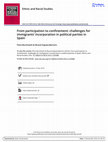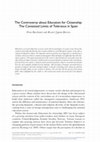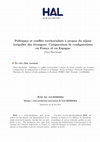Papers by Flora Burchianti

Ethnic and Racial Studies, 2016
The question of the democratic participation of immigrants has been the object of an extensive, t... more The question of the democratic participation of immigrants has been the object of an extensive, theoretical and empirical literature. Nevertheless, we still lack detailed information on those internal dynamics of political parties which shape patterns of participation and representation of immigrants and their descendants, especially in Spain. We focus on how immigrants incorporate political parties in Spain and how this mode of incorporation influences the opportunities for immigrants to access elite positions and candidacies. On the one hand we examine individual trajectories in accessing and evolving in parties and, on the other hand, party strategies to reach out and include immigrants. We acknowledge a persisting gap between the access and participation in political parties, which has been facilitated over recent years, and the many obstacles in accessing elite and candidate positions in Spain.
Journal of Immigrant & Refugee Studies, 2014
The accuracy of the Content should not be relied upon and should be independently verified with p... more The accuracy of the Content should not be relied upon and should be independently verified with primary sources of information. Taylor and Francis shall not be liable for any losses, actions, claims, proceedings, demands, costs, expenses, damages, and other liabilities whatsoever or howsoever caused arising directly or indirectly in connection with, in relation to or arising out of the use of the Content. This article may be used for research, teaching, and private study purposes. Any substantial or systematic reproduction, redistribution, reselling, loan, sub-licensing, systematic supply, or distribution in any form to anyone is expressly forbidden.

Education is of crucial importance to ensure social cohesion and progress in a given society. Eve... more Education is of crucial importance to ensure social cohesion and progress in a given society. Even if the content of citizenship education has been a matter of debate in several European countries, it has taken a singular development in Spain. The important controversy that has been triggered by its introduction in secondary school curriculum is a matter of interrogation: Why did Spain react differently than other European countries? The argument put forward in this article is that education for citizenship reveals the impossibility for Spain to provide a stabilised and consensual definition of national values and identity, precisely because the country is characterised by unresolved questions about its territorial and national diversity, and exemplifies multiple diversity challenges. After providing a European contextualisation of questions of religious and values teaching in Spain, we present a chronology of the controversy and then analyse the public debate in terms of limits to ...

The project investigates whether European societies have become more or less tolerant during the ... more The project investigates whether European societies have become more or less tolerant during the past 20 years. In particular, the project aims to clarify: (a) how is tolerance defined conceptually, (b) how it is codified in norms, institutional arrangements, public policies and social practices, (c) how tolerance can be measured (whose tolerance, who is tolerated, and what if degrees of tolerance vary with reference to different minority groups). The ACCEPT PLURALISM consortium conducts original empirical research on key issues in school life and in politics that thematise different understandings and practices of tolerance. Bringing together empirical and theoretical findings, ACCEPT PLURALISM generates a State of the Art Report on Tolerance and Cultural Diversity in Europe, a Handbook on Ideas of Tolerance and Cultural Diversity in Europe, a Tolerance Indicators Toolkit where qualitative and quantitative indicators may be used to score each country's performance on tolerating cultural diversity, and several academic publications (books, journal articles) on Tolerance, Pluralism and Cultural Diversity in Europe. The ACCEPT PLURALISM consortium is formed by 18 partner institutions covering 15 EU countries. The project is hosted by the Robert Schuman Centre for Advanced Studies and coordinated by Prof. Anna Triandafyllidou. Coordinator: The Robert Schuman Centre for Advanced Studies (RSCAS) at the European University Institute (EUI), directed by Stefano Bartolini from September 2006, was set up in 1992 as a complementary initiative to develop inter-disciplinary and comparative research and to promote work on the major issues facing the process of integration and European society. The Centre hosts research programmes and projects, and a range of working groups and ad hoc initiatives.
This text may be downloaded only for personal research purposes. Additional reproduction for othe... more This text may be downloaded only for personal research purposes. Additional reproduction for other purposes, whether in hard copies or electronically, requires the consent of the author(s), editor(s). If cited or quoted, reference should be made to the full name of the author(s), editor(s), the title, the research project, the year and the publisher.

The settlement of undocumented immigrants is challenging state's policies in France and Spain... more The settlement of undocumented immigrants is challenging state's policies in France and Spain. The irregular stay of migrants is usually analysed through a functionalist lens which acknowledges the failure of control and deterrence policy against unauthorized migration, or, underlines their function as a labour force or in vote-catching arguments in political speeches. This research seeks to implement a sociological approach to understand precisely the political incidence of undocumented migrants' settlement. By using a local perspective, it appears that the framework of exclusion designed by states and European policies gives way to diverse local configurations in which multilevel social and political interactions and the involvement of private actors, contribute to the local policy-making process. The political control and deterrence of unauthorized migrants raise local contention in favour of the legalization or the improvement of these immigrants' living conditions. ...
Sciences de l'Homme et de la Société.
Les mauvais traitements subis par les travailleuses agricoles dont nous allons parler sont à dist... more Les mauvais traitements subis par les travailleuses agricoles dont nous allons parler sont à distinguer d'un phénomène de persécution de grande ampleur, tel que l'on peut le rencontrer lors de certains conflits armés ou dans des territoires où la prégnance de normes traditionnelles ...
... Gods in the City. Intercultural and Inter-Religious Dialogue at Local Level, Palard, Jacques ... more ... Gods in the City. Intercultural and Inter-Religious Dialogue at Local Level, Palard, Jacques (ed) (Ed.) (2008) 107-136. Local Authorities and Interfaith Dialogue in Spain. Flora Burchianti 1 , Xabier Itçaina 1. (2008). 1 : Science Politique Relations Internationales Territoire (SPIRIT). ...

La presence d'etrangers en situation administrative irreguliere en France et en Espagne, inte... more La presence d'etrangers en situation administrative irreguliere en France et en Espagne, interroge les politiques menees par l'Etat. La plupart des approches du sejour irregulier des etrangers se fondent sur une lecture fonctionnaliste, soit pour souligner le dysfonctionnement d'une politique de lutte contre les flux irreguliers, soit pour mettre en evidence leur fonctionnalite sur le marche du travail ou pour des usages electoralistes. Dans cette recherche, nous avons voulu d'abord sociologiser l'analyse des effets politiques de la presence d'etrangers sans titre de sejour pour comprendre de quelle facon elle etait apprehendee par l'action publique. En deplacant notre regard dans les contextes d'action locaux, le cadre d'exclusion mis en place par les politiques nationales et europeenne laisse place a un jeu plus ouvert, ou les interactions, des jeux d'echelle et l'association d'acteurs prives contribuent a definir les regles de trait...
Spain has become a pole of attraction for immigration in Europe and has received almost 5 million... more Spain has become a pole of attraction for immigration in Europe and has received almost 5 million immigrants since 2000. But unlike other European countries, no important extreme-right party in terms of electoral results has existed in the country since the re-establishment of a democratic regime at the end of the 1970s. Spanish policy towards immigrants settled in the country has been fairly progressive, in particular because migration was considered to be beneficial for the Spanish labour market and welfare system.

La presence d'etrangers en situation administrative irreguliere en France et en Espagne, inte... more La presence d'etrangers en situation administrative irreguliere en France et en Espagne, interroge les politiques menees par l'Etat. La plupart des approches du sejour irregulier des etrangers se fondent sur une lecture fonctionnaliste, soit pour souligner le dysfonctionnement d'une politique de lutte contre les flux irreguliers, soit pour mettre en evidence leur fonctionnalite sur le marche du travail ou pour des usages electoralistes. Dans cette recherche, nous avons voulu d'abord sociologiser l'analyse des effets politiques de la presence d'etrangers sans titre de sejour pour comprendre de quelle facon elle etait apprehendee par l'action publique. En deplacant notre regard dans les contextes d'action locaux, le cadre d'exclusion mis en place par les politiques nationales et europeenne laisse place a un jeu plus ouvert, ou les interactions, des jeux d'echelle et l'association d'acteurs prives contribuent a definir les regles de trait...
This briefing note highlights NEW KNOWLEDGE about Spain. We present here new knowledge and key me... more This briefing note highlights NEW KNOWLEDGE about Spain. We present here new knowledge and key messages for policy makers and civil society. Ongoing project June 2013-Issue 2013/17 ACCOMMODATING ETHNIC, RELIGIOUS AND CULTURAL DIVERSITY IN SPAIN Spain has been part of the so-called "new" countries of immigration in the years 2000s with the arrival of five million immigrants over a ten year period. In 2010, non-nationals accounted for 14% of the total population. The country is currently witnessing a new phase in relation to migration and diversity. The transition from reception policies to an emphasis on (long term) accommodation is taking place in an unfavourable context of severe economic crisis since 2008.











Uploads
Papers by Flora Burchianti